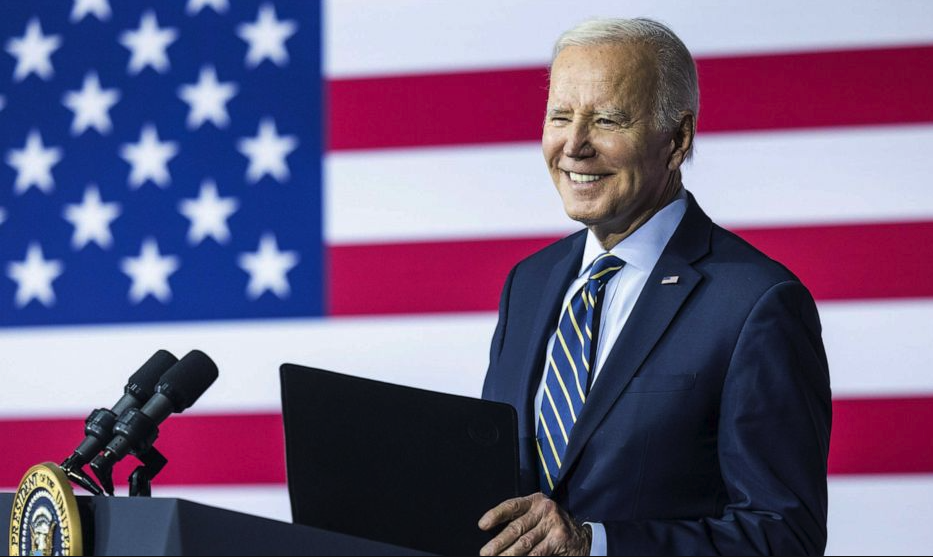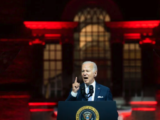Political Analysis –
By Glynn Wilson –
WASHINGTON, D.C. — While public opinion data shows the American people do not seem ready or excited to begin the official campaign season for president in 2024, especially if the campaign is going to be a rematch between President Joe Biden and loser Donald Trump, Biden announced his run officially on Tuesday in a 3-minute video, kicking off the campaign whether people are ready or not.
As it was covered by The New York Times, Biden urged voters to let him “finish the job.â€
Biden says he has spent his first years in office fighting for democracy and freedom, and he warns that “MAGA extremists†around the country — using Trump’s “Make America Great Again†slogan — threaten those freedoms.
“When I ran for president four years ago, I said we are in a battle for the soul of America. And we still are,†Biden says in the video, adding: “That’s why I’m running for re-election.â€
The formal declaration of Biden’s candidacy comes four years to the day after he said he would seek the presidency in 2019, asserting at the time that it was vital to prevent Trump from winning a second term.
“Biden succeeded in 2020,” the Times reports. “But if Trump becomes the Republican nominee — he is currently the front-runner — Biden’s legacy will be determined by whether he is able to once again block Trump’s return to power.”
The president does not mention Trump by name in the video. But the subtext is clear — it starts with scenes of the Jan. 6 assault on the Capitol. When Biden says the words “MAGA extremists,†the screen flashes a picture of Trump with his arm on the shoulder of Florida Gov. Ron DeSantis, another potential Republican rival.
“Every generation of Americans has faced a moment when they’ve had to defend democracy,†Biden says. “Stand up for our personal freedoms. Stand up for the right to vote and our civil rights. And this is our moment.â€
Biden’s schedule and his messaging is likely to remain the same in the short term, according to the Times, quoting aides saying he is expected to keep up the same themes he had focused on for months: claiming credit for an improving economy and assailing Republicans on abortion, tax cuts, guns and intolerance.
But fund-raising will ramp up quickly, they report, as the president’s top donors have been invited to a summit in Washington on Friday to begin raising money for the campaign which is expected to need at least $2 billion, according to reporting by national television networks.
So far Biden appears to be operating without primary opposition, despite concerns about his age. At 80, he is already the oldest American president in history. Polls show that Democrats yearn for a fresh face in 2024, but they just don’t know who that would be.
Biden chose Julie Chávez RodrÃguez, a top adviser in the White House, to be his campaign manager. Quentin Fulks, who managed the 2022 campaign for Senator Raphael G. Warnock of Georgia, will be her deputy. But other members of Biden’s inner circle — including Jen O’Malley Dillon, his previous campaign manger, and Anita Dunn, his communications guru — will stay in the White House for now, the Times reports.
Biden’s team is betting that his opponent will likely be Trump, and is preparing accordingly. But the president has already begun ramping up his criticism of all Republicans, calling them “MAGA extremists.â€
Seizing the Day
According to another analysis piece on Biden’s announcement, the Times says the official declaration finally ended any lingering suspense over Biden’s intentions and effectively cleared the way to another nomination for the president, “barring unforeseen developments.”
While Biden had repeatedly and consistently said he intended to run, he stoked speculation by delaying his kickoff for months. Now his team can assemble the formal structure of a campaign organization and raise money to finance it.
“Around the country, MAGA extremists are lining up to take on those bedrock freedoms away,†Biden said, using Trump’s Make America Great Again slogan to describe the former president’s allies. “Cutting Social Security that you’ve paid for your entire life while cutting taxes for the very wealthy. Dictating what health care decisions women can make, banning books and telling people who they can love. All while making it more difficult for you to be able to vote.
“When I ran for president four years ago,†he added, “I said we were in a battle for the soul of America. And we still are.â€
The president has cast himself as a protector of democracy and a stabilizing force after the upheaval of the Trump administration. Biden is running for re-election as the oldest person ever to hold the presidency, a subject of concern among many Democrats, though the party has publicly set aside those worries and rallied around him.
Except for Robert Kennedy, a Democrat and a vaccine skeptic and member of the Kennedy political dynasty, who has declared that he would challenge President Biden for the Democratic nomination in a long-shot bid.
The former president is running to retake the office he lost in 2020. Though somewhat diminished in influence within the Republican Party — and facing several legal investigations — Trump retains a large and committed base of supporters, and he could be aided in the primary by multiple challengers splitting a limited anti-Trump vote.
Nikki Haley. The former governor of South Carolina and U.N. ambassador under Trump has presented herself as a member of “a new generation of leadership†and emphasized her life experience as a daughter of Indian immigrants. She was long seen as a rising G.O.P. star but her allure in the party has declined amid her on-again, off-again embrace of Trump.
Asa Hutchinson. The former governor of Arkansas is one of a relatively small number of Republicans who have been openly critical of Trump. Hutchinson has denounced the former president’s efforts to overturn the 2020 election and said Trump should drop out of the presidential race.
Marianne Williamson. The self-help author and former spiritual adviser to Oprah Winfrey is running for a second time. In her 2020 campaign, the Democrat called for a federal Department of Peace, supported reparations for slavery and called Trumpism a symptom of an illness in the American psyche that could not be cured with political policies.
Vivek Ramaswamy. The multimillionaire entrepreneur and author describes himself as “anti-woke†and is known in right-wing circles for opposing corporate efforts to advance political, social and environmental causes. He has never held elected office and does not have the name recognition of most other G.O.P. contenders.
Larry Elder. The conservative talk radio host, who was a breakout star for the right after running unsuccessfully in California’s recall election in 2021, announced on Tucker Carlson’s show on Fox News that he was running for president, saying that he had “a moral, religious and a patriotic duty to give back to a country that’s been so good to my family and me.â€
Others who might run. Gov. Ron DeSantis of Florida, former Vice President Mike Pence, Senator Tim Scott of South Carolina and Gov. Chris Sununu of New Hampshire are seen as weighing Republican bids for the White House.
Although he described himself as “a bridge†to the next generation during his 2020 campaign, a comment that some interpreted as a hint that he would serve only one term, Biden concluded that he was not in fact ready to hand over the torch yet. His decision was fueled in part, aides said, by his antipathy for Trump and his belief that he is the Democrat best positioned to keep the criminally indicted and twice-impeached former president from recapturing the White House.
In offering himself as a candidate again, Biden is asking Americans to trust him with the powers of the commander in chief well into his ninth decade. Biden is already the oldest president in American history, and, if he were to win, he would be 86 at the end of a second term, nearly nine years older than Ronald Reagan was when he left the White House in 1989. Trump, no youngster at 76, would himself outlast every president by age other than Biden if he were restored to the Oval Office and finished his new term at 82.
If Biden and Trump square off again next year, it would be the first time that the same nominees faced each other in consecutive presidential elections since 1956, when Dwight D. Eisenhower beat Adlai Stevenson for the second time. It would also be the first time a president was challenged by his predecessor since Theodore Roosevelt attempted a comeback in 1912 against his handpicked successor, William Howard Taft, in a three-way campaign won by Woodrow Wilson.
While Biden presides over a more unified party than his potential challenger does, many Democrats privately worry that the president may not be up to another campaign. His overall approval rating remains mired at just over 42 percent, according to an aggregation of polls by the political website FiveThirtyEight, lower than 10 of the last 13 presidents at this point in their terms.
The Polls
While polls show that most Democrats have favorable opinions about Biden, a majority of them would still rather he not run again. In a survey by NBC News released this week, 70 percent of Americans, including 51 percent of Democrats, said he should not seek a second term. Seven out of 10 of those who did not want him to serve four more years cited his age as a factor.
Biden and Trump face a strikingly competitive race, with recent polls by Yahoo News, The Wall Street Journal and Morning Consult showing the president slightly ahead while surveys by The Economist and the Harvard University Center for American Political Studies find him trailing by several points. Biden faces similarly mixed results against Gov. Ron DeSantis of Florida, the strongest challenger to Trump for the Republican nomination.
Biden’s announcement represented the latest improbable chapter in a long life in public office, the fourth time he has thrown his hat in the presidential ring and presumably the last campaign of a half-century-plus career that began with his election to the New Castle County Council in 1970.
Over the course of 36 years in the Senate, eight years as vice president and campaigns for the White House in 1988, 2008 and 2020, Biden has become one of the most familiar faces in American life, known for his resilience in adversity as well as his habitual gaffes. And yet the avuncular, backslapping, work-across-the-aisle deal maker has struggled to translate decades of good will into the unifying presidency he promised.
Working with the narrowest of partisan margins in Congress, Biden in his first two years scored some of the most ambitious legislative victories of any modern president, including a $1.9 trillion Covid-19 relief package; a $1 trillion program to rebuild the nation’s roads, highways, airports and other infrastructure; and major investments to combat climate change, lower prescription drug costs for seniors, treat veterans exposed to toxic burn pits and build up the nation’s semiconductor industry. Some of those bills passed with Republican votes.
Along the way, he has revitalized international alliances that had frayed under Trump, rallying NATO and other partners around the world to stand against Russia’s unprovoked invasion of Ukraine. With bipartisan support, he has committed more than $100 billion to arm Ukraine’s military and help its government and people survive the Russian onslaught.
Yet his decision to withdraw forces from Afghanistan after 20 years in keeping with an agreement with the Taliban struck by Trump led to a debacle in 2021 in which the radical militants took over the country, fleeing Afghans swarmed American airplanes taking off from Kabul and a suicide bomber killed 13 American troops and 170 Afghans during the withdrawal.
Biden has also struggled to secure the southwestern U.S. border, where illegal migration has soared, and he has had mixed success in stabilizing the post-pandemic economy, which saw inflation rise to its highest level in four decades and gas prices shoot up to record levels. While both have begun to come back down and unemployment is near historic lows, many Americans remain unsettled by economic anxiety.
Perhaps most frustrating to Biden, his hopes to heal the rifts that widened under Trump have so far been dashed, with American society still deeply polarized and his predecessor still a potent force in stirring the forces of division and emboldening white supremacists and anti-Semites.
The president’s critics say that Biden is the one who is divisive because of his attacks on Trump’s “ultra-MAGA Republicans,†and they portray him as a socialist bent on destroying the country. Regardless of whom they nominate, Republicans expect to challenge Biden next year by linking him to the nation’s economic troubles and depicting him as a feckless leader held captive by his party’s activist left.
Even as Biden put off a formal kickoff to his re-election bid, his team had been quietly making plans for the coming campaign. Top advisers such as Anita Dunn, Steven J. Ricchetti and Jennifer O’Malley Dillon will oversee the campaign from the White House even though the operation’s formal headquarters will almost certainly be in Wilmington, Del., under Ms. Chavez Rodriguez’s direction.
But it will be much different than any campaign in which Biden has ever run. His first two bids for the White House each collapsed by the end of the first caucus, in an era long before the ubiquitous presence of social media and modern technological techniques, and his 2020 campaign was warped by the Covid-19 pandemic, which kept him largely isolated at his home in Delaware.
This time aides said he planned a vigorous campaign travel schedule but would lean heavily on digital communications that bypass the traditional news media. The emerging contest will be complicated by the fact that his opponent is under criminal indictment by a local Democratic prosecutor in New York on charges of covering up hush money paid to a porn star and is being investigated by Biden’s own Justice Department for instigating the Jan. 6, 2021, attack on the Capitol and illegally refusing to turn over classified documents.
Although Biden has remained publicly silent on Trump’s legal troubles, the former president has tried to blame the incumbent, accusing him of wielding the justice system against him out of partisan animus. No evidence of that has surfaced, but Biden’s own handling of classified documents is being investigated by a special counsel and his son Hunter Biden is being investigated by another federal prosecutor.
Biden’s strategists recognize that he starts off the campaign with significant vulnerabilities but are banking on the idea that however ambivalent swing voters may be about him, they are dead set against putting Trump back in the White House. If they face another Republican, they plan to argue that anyone who wins that party’s nomination will have to adopt the same radical positions as Trump.
More Public Opinion
According to a public opinion story that ran in the Washington Post before the announcement, polls and dozens of interviews show most of his party does not want him to be their nominee. But the lack of enthusiasm is tempered by another widespread motivator working in Biden’s favor: The determination to prevent a second Donald Trump term or the ascent of another Trump-like politician.
“From Atlanta to Avondale, Ariz., Democrats this spring have collectively voiced both sentiments,” the Post reports. “Across a wide range of demographic and ideological groups that make up the Democratic coalition, the reactions revealed a party accepting Biden as its standard-bearer — but only reluctantly.”
Across eight national polls in 2022 and 2023, an average of 38 percent of Democrats wanted Biden to be the party’s presidential nominee in 2024 — while a 57 percent majority wanted to nominate someone else. During Trump’s first term, an average of 73 percent of Republicans wanted the GOP to renominate him. An average of 75 percent of Democrats wanted to renominate Barack Obama during his first presidential term. There is no indication at this early stage that Biden will face any major primary challengers.
Biden showed an ability in 2020 to draw support from independents who turned away from the GOP. But he also had a strong backing from his party’s voters, whom he will need to reinvigorate in 2024. Democrats The Post interviewed generally said they saw Biden as an effective president but expressed frustration with some unfulfilled promises, anxiety about his ability to understand the priorities of a diversifying country and, running through it all, unease about Biden’s age.
The worries come after what the administration has billed as a historically productive period. Biden has enacted an array of Democratic priorities including a sweeping pandemic relief package, a measure to repair and replace aging infrastructure, and far-reaching legislation aimed at fighting climate change, increasing American competitiveness and stanching inflation.
“President Biden inherited the worst crises in generations and turned them around to deliver unprecedented job growth, the biggest climate investments in history — which are reshoring manufacturing to America — Medicare’s new power to negotiate lower drug costs, and the restoration of our alliances in the world,†White House spokesman Andrew Bates said in a statement. “He’s standing up for mainstream values like the restoration of Roe v. Wade and against extreme MAGA efforts to sell out middle class families to rich special interests.â€
Almost all the Democrats The Post interviewed said they would vote for Biden in a general election, and some conceded that, while he was far from their first choice, he might be the best option for the current moment — a contrast to a Republican Party promoting grievance and combativeness.
Trump has sounded vengeful notes as his legal peril has intensified. And Florida Gov. Ron DeSantis, who has declared war on the left and enacted polarizing policies, is shaping up as Trump’s most formidable GOP rival. At 76, Trump also faces questions about whether he is too old to be an effective president, in contrast to DeSantis, who is 44.
Biden is the only person who has defeated Trump in a national election, but many Democrats saw him as a caretaker president who would make way for a new generation of leaders.
Together, these dynamics set the stage for a central question confronting Democrats in the next election: Will fear of GOP extremism be enough to overcome anxieties about Biden?
More Inside Analysis
That is a good question.
It makes me also ask whether a rematch between Biden and Trump will generate either the fear of an existential crisis that motivated Democrats in 2020, or the anger that Trump’s Republican base felt in supporting him for reelection in 2020. Both of those factors led to one of the highest voter turnouts in any recent U.S. election.
According to the Brookings Institute, voter turnout in the 2020 election was exceptionally high, with 66.8 percent of eligible voters casting ballots, resulting in a victory for Joe Biden.
This was the biggest turnout in a presidential election since 1992 (67.7%) and more than 5 points higher than the 2016 election.
Recently released results from the Census Bureau’s Current Population Survey voting supplement indicate that 2020’s voting spike occurred across both Democratic-leaning demographic groups and Republican-leaning ones. In particular, there was a noticeable increase in voting among white adults who did not graduate from college (the so-called “non-college white†group).
On the other hand, there was an accentuated turnout among young people and people of color, representing the increasing influence of voters who heavily lean toward Democratic presidential candidates. They provided the margin for Biden’s history, along with independent voters who also expressed fears about another Trump term.
“This raises the question as to whether even greater turnout among white non-college voter groups — or Republican efforts to alter voting requirements in their favor — will be enough to counter the influence of young voters and voters of color in future presidential elections,” the institute asks.
A better question might be which groups will be more motivated in 2024, young and minority voters for Biden, or Trump’s base. It could be a different race if voter turnout lags on either side, or both.
___
If you support truth in reporting with no paywall, and fearless writing with no popup ads or sponsored content, consider making a contribution today with GoFundMe or Patreon or PayPal.















Age and Hunter are going to be serious distractions, wish he had put more thought into this.